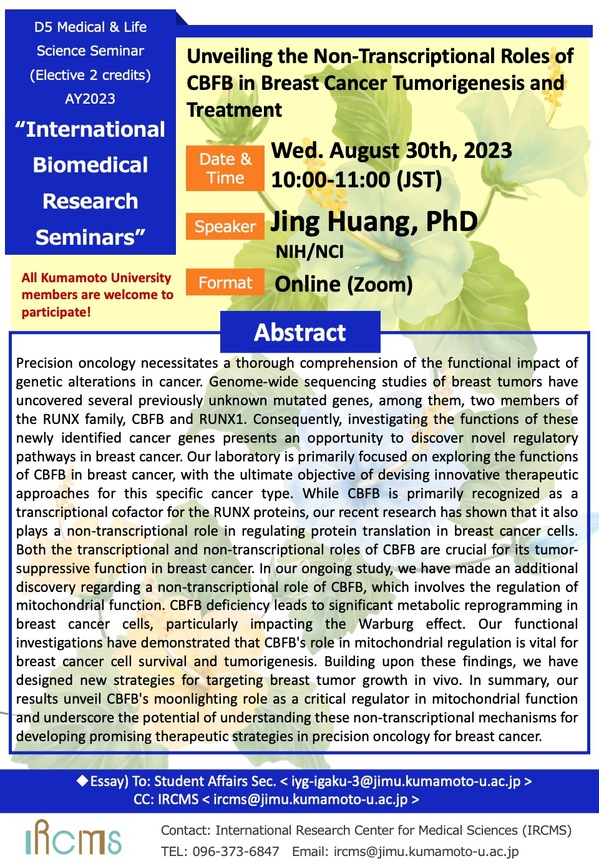- HOME
- News & Events
- [Aug. 30] D5 Seminar- Jing Huang, PhD (NIH, NCI)
News & Events
[Aug. 30] D5 Seminar- Jing Huang, PhD (NIH, NCI)
August 10 2023
The "D5 Medical & Life Science Seminar" course will be offered by International Research Center for Medical Sciences (IRCMS). It will run from May 2023 to March 2024, with lectures given by scientists who are affiliated with IRCMS or in collaboration with researchers at IRCMS. The lectures will be given once a month, in English, and by leading scientists in the relevant research field. Students will be taught: 1) how normal physiological functions are maintained in the human body; 2) how these systems become abnormal under certain pathophysiologic conditions; 3) why stem cells are important in animal development and homeostasis; 4) how stem cell-based approaches can help us understand disease mechanisms and find potential cure for diseases related to stem cell malfunction (e.g., cancer, aging).
Anyone who wants to join is welcome.
For students who have registered for the course, please check your attendance in Moodle.
Date : August 30, 2023 (Wednesday)
Format : Online (Zoom)
Time : 10:00 - 11:00 (JST)
Speaker : Jing Huang, PhD (NIH)
Title : Unveiling the Non-Transcriptional Roles of CBFB in Breast Cancer Tumorigenesis and Treatment
Abstract :
Precision oncology necessitates a thorough comprehension of the functional impact of genetic alterations in cancer. Genome-wide sequencing studies of breast tumors have uncovered several previously unknown mutated genes, among them, two members of the RUNX family, CBFB and RUNX1. Consequently, investigating the functions of these newly identified cancer genes presents an opportunity to discover novel regulatory pathways in breast cancer. Our laboratory is primarily focused on exploring the functions of CBFB in breast cancer, with the ultimate objective of devising innovative therapeutic approaches for this specific cancer type. While CBFB is primarily recognized as a transcriptional cofactor for the RUNX proteins, our recent research has shown that it also plays a non-transcriptional role in regulating protein translation in breast cancer cells. Both the transcriptional and non-transcriptional roles of CBFB are crucial for its tumor-suppressive function in breast cancer. In our ongoing study, we have made an additional discovery regarding a non-transcriptional role of CBFB, which involves the regulation of mitochondrial function. CBFB deficiency leads to significant metabolic reprogramming in breast cancer cells, particularly impacting the Warburg effect. Our functional investigations have demonstrated that CBFB's role in mitochondrial regulation is vital for breast cancer cell survival and tumorigenesis. Building upon these findings, we have designed new strategies for targeting breast tumor growth in vivo. In summary, our results unveil CBFB's moonlighting role as a critical regulator in mitochondrial function and underscore the potential of understanding these non-transcriptional mechanisms for developing promising therapeutic strategies in precision oncology for breast cancer.

